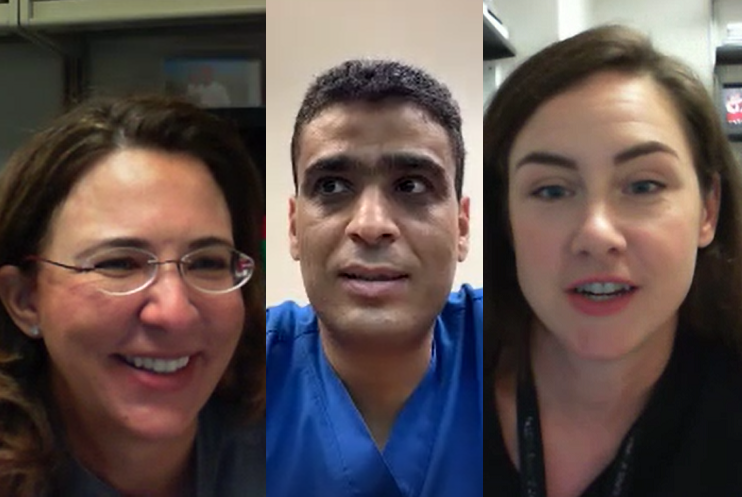Ask a person with a toothache to list “essential workers” and chances are “dentist” will top the list. So when most UMKC operations closed and moved online for the pandemic, some School of Dentistry faculty stayed on call for emergency patients.
“Three of us were used to taking turns answering emergency calls after hours,” Cynthia Petrie, associate professor and chair of the Department of Restorative Clinical Sciences. “Suddenly, everything was ‘after hours,’ but we worked together to get our patients through the difficult time when the school closed.”
Another member of the emergency team, Ahmed Zarrough, clinical assistant professor, said they did their best with phone calls and teledentistry to determine the nature and severity of callers’ conditions. Though initial pain relief often could be taken care of over the phone, the team members didn’t hesitate to have patients come in when needed — and to call on their specialist colleagues.
“We could do restorative work,” Zarrough said, “but I have to give a big shout out to endodontics and oral surgery. When patients needed an extraction or a root canal, those specialists stepped in and took care of them.”
Similarly, Petrie said, problems with braces led to frequent calls to the school’s orthodontists.
“Orthodontists rarely get emergencies,” Petrie said, when their practices are open. But with their practices shut down, “they had a couple of emergencies every day.”
An important part of the emergency team’s work was advising and reassuring callers, especially early in the pandemic, said Melynda Meredith, a clinical associate professor in the Department of Restorative Clinical Sciences who is the third member of the school’s emergency dental team.
“We were a counseling service of sorts for concerned patients,” she said. “Some of them were so scared at first. There was so much unknown in March and April, and if you even had a minor dental issue, it made it seem more severe. But just being there to offer reassurance — to let them know it will be OK — seemed to help a lot. And once I got out of my house and came back to the school the first time, I felt much better, too.”
“I have to give a big shout out to endodontics and oral surgery. When patients needed an extraction or a root canal, those specialists stepped in and took care of them.”
If anything, she said, patients with urgent needs might have been seen more quickly during the shutdown.
“Before, we could always say ‘come in tomorrow’ or ‘come in Monday’ if a problem could wait,” Meredith said. “But with everything closed, we got people in as quickly as we could.”
Though the team members didn’t work side-by-side, they said communication with one another and with other colleagues was a key to providing excellent care during the shutdown. For example, the school donated most of its personal protective equipment to hospitals nearby, but the dental faculty who run the clinics made sure to keep enough on hand for emergencies.
“We also made sure to let each other know about patients who might need continuing care,” Zarrough said, “and to plan ahead.”
The team members’ triage duties have lessened a bit as the school slowly and carefully reopens its clinics. An operator is back on phone duty most days from 8 a.m. to 4:30 p.m., and some non-emergency patients are being scheduled (primarily those who had to stop mid-treatment when things shutdown). But the team members still cover emergencies after hours and are ready to do whatever is needed.
“We have hundreds of patients,” Petrie said, “and with our added precautions, we don’t expect to be able to treat the same volume we did before. But we will provide safe, excellent care — and continue to handle the emergencies as they arise.”

